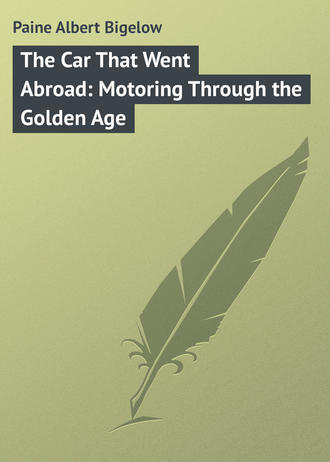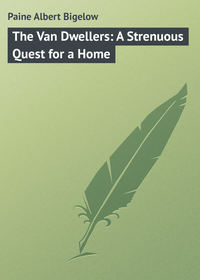
The Car That Went Abroad: Motoring Through the Golden Age
Further news came – still better. The government would send a battleship – the Tennessee– with a large sum of gold. The deposit of this specie in the banks of Europe would make checks and letters of credit good again. Various monies from American banks, cabled for by individuals, would also arrive on this ship.
Things generally looked brighter. With the British fleet protecting the seas, English, French, and Dutch liners were likely to keep their schedules; also, there were some Italian boats, though these were reported to be overrun by "swell" Americans who were paying as high as one thousand dollars for a single berth. Perhaps the report was true – I don't know. None of our crowd cared to investigate.
There were better plans nearer home – plans for "beating it" out of Switzerland on a big scale. Special trains were to be provided – and ships. A commission was coming on the Tennessee to arrange for these things. The vessel had already left New York.
The crowd at the Consulate grew larger and more feverishly interested. Applications for passports multiplied. Over and over, and in great detail, the Brooklyn judge explained just what was necessary to insure free and safe departure from Europe when the time came to go. Over and over we questioned him concerning all those things, and concerning ever so many other things that had no particular bearing on the subject, and he bore it and beamed on us and was fully as patient as was Moses in that other wilderness we wot of.
Trains began to run again through France; at least they started, and I suppose they arrived somewhere. Four days, six days, eight days was said to be the time to Paris, with only third-class coaches, day and night, all the aisles full – no food and no water except what was carried. It was not a pleasant prospect and few of our people risked it. The Tennessee was reported to have reached England and the special American trains were promised soon. In fact, one was presently announced. It went from Lindau, through Germany, and was too far east for most of our crowd. Then there were trains from Lucerne and elsewhere; also, special English trains. Then, at last a Simplon train was scheduled: Territet, Montreux, Vevey, Lausanne, Geneva – all aboard for Paris!
Great excitement at the Consulate. The Tennessee money could arrive any day now; everybody could pay up and start. The Brooklyn judge rehearsed each morning all the old details and presented all the news and requirements. The train, he said, would go through a nation that was at war. It would be under military surveillance. Once on the train, one must stay on it until it arrived in Paris. In Paris passengers must go to the hotels selected, they must leave at the time arranged and by the train provided, and must accept without complaint the ship and berth assigned to each. It would be a big tourist party personally conducted by the United States for her exiled citizens. The United States was not ordering its citizens to leave Switzerland; it was merely providing a means for those who must go at once and had not provided for themselves. The coaches would be comfortable, the price as usual, red cards insuring each holder a seat would be issued at the Consulate. Tickets through to New York would be provided for those without funds. The government could do no more. Any questions, please?
Then a sharp-faced, black-haired, tightly hooked woman got up and wanted to know just what style the coaches would be – whether they would have aisles down the side; whether there would be room to lie down at will; whether meals would be served on the train; whether there would be time at Dijon to get off and see some friends; whether she could take her dog; whether her ticket would be good on another train if she didn't like this one when she saw it. The judge will probably never go into the tourist-agency business, even if he retires from the law.
Well, that particular train did not go, after all. Or, rather, it did go, but few of our people went on it. There was a misunderstanding somewhere. The Germans were getting down pretty close to Paris just then, and from the invisible "somewhere" an order came countermanding the train. The train didn't hear of it, however, and not all of the people. Those who took it must have had plenty of room, and they must have gone through safely. If the Germans got them we should have heard of it, I think. Those who failed to take it were not entirely sorry. The Tennessee money had not been distributed yet, and it was badly needed. I don't know what delayed it. Somewhere – always in that invisible "somewhere" – there was a hitch about that, too. It still had not arrived when the next train was scheduled – at least, not much of it. It had not come on the last afternoon of the last day, when the train was to go early in the morning. It was too bad. There was a borrowing and an arranging and a negotiating at the banks that had become somewhat less obdurate these last days, with the Tennessee in the offing. But many went away pretty short, and, but for the consul, the shortness would have been shorter and more general.
It was a fine, big, comfortable train that went next morning. A little group of us who were not yet ready to "beat it" went down to see our compatriots go. There seemed to be room enough, and at least some of the coaches had aisles down the sides. I do not know whether the sharp-faced, tightly hooked woman had her dog or not. There was a great waving, and calling back, and much laughter as the train rolled away. You could tell as easily as anything that the Americans were "beating it" for home.
Heavy installments of the Tennessee money began to arrive at the Consulate next day. I got some of it myself.
A day or two later I dropped into the Consulate. It had become a quiet place again, as in the days that already seemed very long ago. It was hard to believe in the reality of the eager crowd that used to gather there every morning to tell their troubles and laugh over them, and to collect the morning news. Now, again, the place was quite empty, except for a few flies drowsing about and the rather tired, bored-looking man who came to spend an hour or two there every morning, killing time and glad of any little diversion in the way of company.
Chapter XXXVII
THE LONG TRAIL ENDS
It was not until near the end of October that we decided to go. We had planned to remain for another winter, but the aspect of things did not improve as the weeks passed. With nine tenths of Europe at war and the other tenth drilling, there was a lack of repose beneath the outward calm, even of Vevey. In the midst of so many nervous nations, to linger until spring might be to remain permanently.
Furthermore, our occupations were curtailed. Automobiles were restricted, the gasoline supply cut off. The streets had a funereal look. I was told that I could get a special permit to use the car, but as our gasoline supply consisted of just about enough to take us over the Simplon Pass into Italy, we decided to conserve it for that purpose. The pass closes with the first big snow, usually the 15th of October. The presence of many soldiers there would keep it open this year a little longer. It could not be risked, however, later than the end of the month.
We debated the matter pretty constantly, for the days of opportunity were wasting. We wasted ten of them making a little rail and pedestrian trip around Switzerland, though in truth those ten glorious days of October tramping along the lakes and through the hills are not likely to be remembered as really wasted by any of us. When we returned I got a military pass to take the car out of Switzerland, but it was still another week before we packed our heavy baggage and shipped it to Genoa. We were a fair example of any number of families, no longer enthralled by Europe and not particularly needed at home. I think hesitation must have nearly killed some people.
It was the 27th of October – a perfect morning – when for the last time I brought the car to the front of our hotel, and we strapped on our bags and with sad hearts bade good-by to the loveliest spot and the best people in Europe. Then presently we were working our way through the gay, crowded market place (though we did not feel gay) down through the narrow, familiar streets, with their pretty shops where we had bought things, and their little pâtisseries where we had eaten things; down through La Tour, and along the lake to Clarens and Montreux, and past Chillon, and so up the valley of the Rhone to Brigue, the Swiss entrance to the Simplon Pass.
We had new tires now, and were not troubled about our going; but the world had grown old and sad in three months, and the leaves were blowing off of the trees, and the glory had gone out of life, because men were marching and killing one another along those happy fields that such a little while before had known only the poppy stain and the marching of the harvesters – along those shady roads where good souls had run with the car to hand us cherries and wish us "Gute reise."
We crossed the Simplon in the dullness of a gray mist, and at the top, six hundred feet in the peaks, met the long-delayed snowstorm, and knew that we were crossing just in time.
Down on the Italian slope the snow turned to rain and the roads were not good. The Italians dump rock into their roads and let the traffic wear it down. We were delayed by a technicality on the Swiss border, and it was dark by the time we were in Italy – dark and rainy. Along the road are overhanging galleries – really tunnels, and unlighted. Our prestolite had given out and our oil lamps were too feeble. I have never known a more precarious drive than across that long stretch from Gondo to Domodossola, through the night and pouring rain. It seemed endless, and when the lights of the city first appeared I should have guessed the distance still to be traveled at forty miles. But we did arrive; and we laid up three days in a hotel where it was cold – oh, very cold – but where blessedly there was a small open fire in a little sitting room. Also, the food was good.
It had not quit raining even then, but we started, anyway. One can get a good deal of Domodossola in three days, though it is a very good town, where few people stop, because they are always going somewhere else when they get there. Our landlady gave us a huge bunch of flowers at parting, too huge for our limited car space. A little way down the road I had to get out and fix something; an old woman came and held an umbrella over me, and, having no Italian change, I gave her the flowers, and a Swiss nickel, and a German five-pfennig piece, and she thanked me just as if I had contributed something valuable. The Italians are polite.
We went to Stresa on Lake Maggiore, and stopped for the night, and visited Isola Bella, of course, and I bought a big red umbrella which the others were ashamed of, and fell away from me when I opened it as if I had something contagious. They would rather get soaking wet, they said, than be seen walking under that thing. Pride is an unfortunate asset. But I didn't have the nerve myself to carry that umbrella on the streets of Milan. Though Stresa is not far away, its umbrellas are unknown in Milan, and when I opened it my audience congested traffic. I didn't suppose anything could be too gay for an Italian.
We left the car at Milan and made a rail trip to Venice. It was still raining every little while and many roads were under water, so that Venice really extended most of the way to Milan, and automobile travel was thought to be poor in that direction. All the old towns over there we visited, for we were going home, and no one could say when Europe might be comfortable for tourists again. A good deal of the time it rained, but a good deal of the time it didn't, and we slept in hotels that were once palaces, and saw much, including Juliet's tomb at Verona, and all the things at Padua, and we bought violets at Parma, and sausages at Bologna. Then we came back to Milan and drove to Genoa, stopping overnight at Tortona, because we thought we would be sure to find there the ices by that name. But they were out of them, I suppose, for we could not find any.
Still we had no definite plans about America; but when at Genoa we found we could ship the car on a pretty little Italian vessel and join the same little ship ourselves at Naples, all for a very reasonable sum. I took the shipping man to the hotel garage, turned the car over to him, and the thing was done.
So we traveled by rail to Pisa, to Florence, to Rome, to Naples and Pompeii, stopping as we chose; for, as I say, no one could tell when Europe would be a visiting place again, and we must see what we could.
So we saw Italy, in spite of the rain that fell pretty regularly, and the rather sharp days between-time. We did not know that those rains were soaking down to the great central heat and would produce a terrible earthquake presently, or we might have been rather more anxious to go. As it was, we were glad to be there and really enjoyed all the things.
Yet, there was a different feeling now. The old care-freedom was gone; the future had become obscure. The talk everywhere was of the war; in every city soldiers were marching, fine, beautiful regiments, commanded by officers that were splendidly handsome in their new uniforms. We were told that Italy would not go to war – at least not until spring, but it was in the air, it was an ominous cloud. Nowhere in Europe was anything the same.
One day our little ship came down from Genoa, and we went aboard and were off next morning. We lay a day at Palermo, and then, after some days of calm sailing in the Mediterranean, launched out into the Atlantic gales and breasted the storms for nearly two weeks, pitching and rolling, but homeward bound.
A year and four months from a summer afternoon when we had stood on the upper deck of a little French steamer in Brooklyn and looked down into the hold at a great box that held our car, I went over to Hoboken and saw it taken from another box, and drove it to Connecticut alone, for the weather was cold, the roads icy. It was evening when I arrived, Christmas Eve, and when I pushed back the wide door, drove into the barn, cut off the engine, and in the dim winter light saw our capable conveyance standing in its accustomed place, I had the curious feeling of never having been away at all, but only for a winter's drive, dreaming under dull skies of summertime and France. And the old car – that to us had always seemed to have a personality and sentience – had it been dreaming, too?
It was cold there, and growing dark. I came out and locked the door. We had made the circuit – our great adventure was over. Would I go again, under the same conditions? Ah me! that wakens still another dream – for days ahead. I suppose one should not expect more than one real glimpse of heaven in this world, but at least one need not give up hoping.
1
The old rates of exchange are used in this book.
2
Our honey-dew melon is a mild approach to it.
3
The reader is reminded that this was in a day when few cars cranked otherwise than by hand.
4
Written in 1913. Mistral died March 24th of the following year.
5
Daudet in his Lettres de Mon Moulin says:
6
The word arena derives its name from the sand, strewn to absorb the blood.
7
Alphonse Daudet's "La Mule de Pape," in his Lettres de Mon Moulin, gives a delightful picture of Avignon at this period.
8
At Mark Twain's death his various literary effects passed into the hands of his biographer, the present writer.
9
In 1913-14. The rate to-day is somewhat higher.
10
I have thought since that she may have meant that the Swiss do not lead the world in the art and literary industries. She may have connected those things with intelligence – you never can tell.
11
When the call to arms came, August 1, 1914, Switzerland put 250,000 men on her frontier in twenty-four hours.
12
Written at the Anchor Inn, Ouchy, Lausanne, in 1817.
13
"La Diligence de Baucoire" in Lettre de Mon Moulin, Alphonse Daudet.
14
It was oftener from sixteen to eighteen francs, but the time when we stopped at larger towns, like Le Puy, Lyons, and Valence, brought up the average. These are antewar prices. I am told there is about a 50-per-cent increase (on the dollar basis) to-day. The value of the French franc is no longer a fixed quantity.
15
The reader must continue to bear in mind that this was in a golden age. The cost would probably be nearer 150 francs to-day (1921), or $12 American money. Even so, it would be cheaper than staying at home, in America.
16
Tours during the World War became a great training camp, familiar to thousands of American soldiers.
17
She lived six years longer, dying in 1920.









